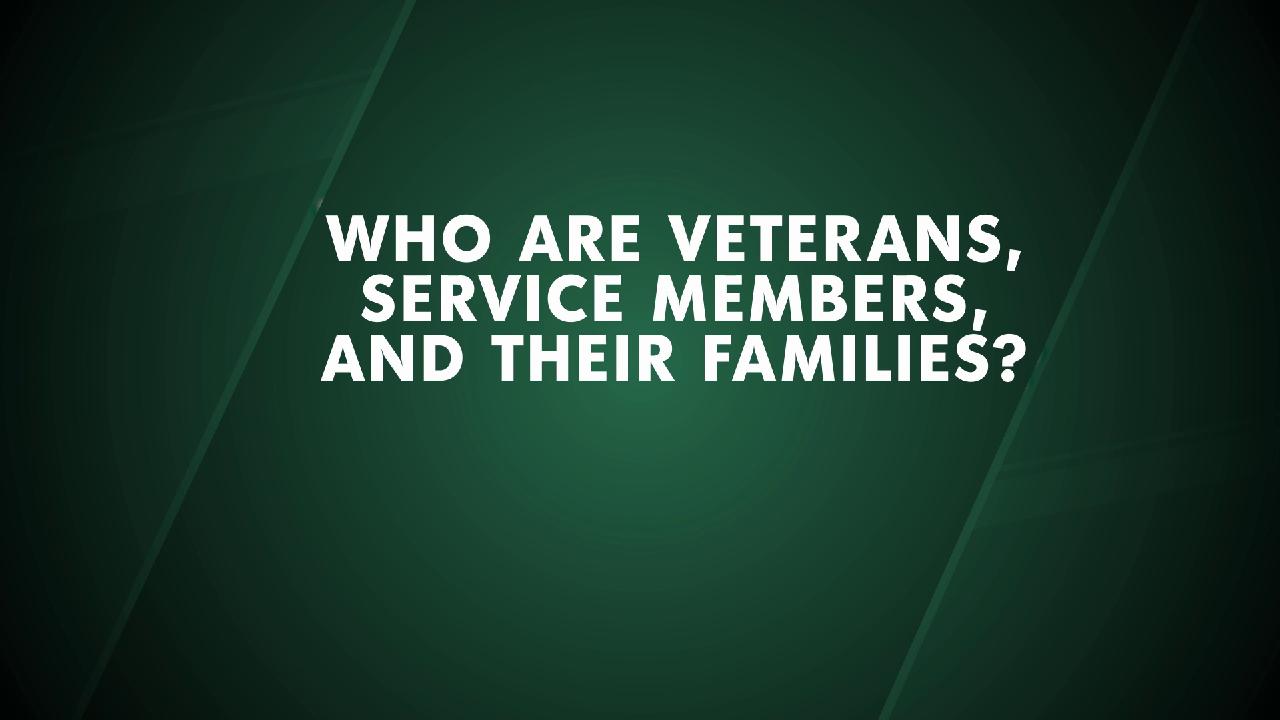Ask the Question: Who are VSMF?
Who Are Veterans, Service Members, and their Families?
Ask the Question: Who are VSMF?
Ask the Question: Who are VSMF?
Transcript of video:
“Have you or a family member ever served in the military?”
That is the question that informs this Toolkit, but what are we really asking?
It’s important to appreciate that each word in this question has value and purpose.
Of the utmost importance is “ever served in the military”. The question must be asked in a manner that allows all who have ever worn the uniform to feel included in the inquiry.
We cannot ask “Are you a Veteran?” if we hope to truly capture the richness of an individual’s experiences and connection to military service.
Not everyone who might federally qualify as a Veteran identifies as a veteran.
Some who served do not feel that the nature of their service is deserving of the title.
They may have personal beliefs that such a title should be reserved only for those who were deployed, or experienced combat, or were wounded.
Some, despite their time in service, do not qualify for the title because: their discharge status prohibits it,
or maybe their service was in the national guard or reserves, and they were never activated.
What about those still actively serving? They wouldn’t identify as a veteran until they were out of the military.
The word “ever” is important because we want anyone who has ever served their country to feel included,
even if the person was dishonorably discharged, or was released before completing basic training.
The word also makes clear that service of any era, peace time or war, is of value and important to disclose.
So who is a Veteran?
According to Title 38 of the Code of Federal Regulations, a “Veteran” is defined as “a person who served in the active military, naval, or air service and who was discharged or released under conditions other than dishonorable”.
A dishonorable discharge strips an individual of all titles and benefits of their service, including the term veteran.
This definition only has relevance when talking about federal veterans’ benefits, VA care, and qualifications for veteran services outside of your facility
For the purposes of this Toolkit, it is imperative that we cast a wide net.
With regard to medical care and service delivery within your facility or organization, a Veteran must be anyone who has ever served, for any length of time, in any military service branch.
Regardless of their time in or discharge status, these individuals may have encountered exposures and experiences that make them medically and culturally unique.
Appreciating that information can make the difference between life and death for someone who has ever served.
The bottom line is this;
when serving those who have ever served within in your own facility,
follow the any, any, any definition of a Veteran (any person, for any length of time, in any military service branch).
When considering a referral to outside care or services, a more careful investigation into the nature of their service may be required.
So now that we have considered who is a Veteran, lets talk about who is a “service member”.
The term service member means a current member of the uniformed services consisting of the armed forces (army, navy, air force, marine corps, and coast guard).
Much like the definition of a veteran, with regard to medical care and service delivery within your facility or organization, a service member is anyone currently serving in any capacity, who puts on the uniform as required for duty or training.
These individuals, despite status as active duty, guard, or reserve may have encountered exposures and experiences that make them medically and culturally unique.
Whether they put the uniform on for one weekend a month or every single day, for the purposes of health care and services, they are a service member.
If you are curious about the differences between active duty, or guard, or reserves, or you’d like to learn more about what the different discharge statuses mean, I encourage you to review the section in the Toolkit titled Understanding the Difference Between Types of Military Service.
And finally, who is a “family member”?
The term family member, as it applies to the Ask the Question initiative, can be anyone closely associated with a veteran or service member,
such that they have been touched or affected by the culture of military service, or the after-effects of their loved-one’s military experiences.
This can include children, parents, spouses, close friends, intimate partners, siblings, grandparents.
There is no limit to this definition and your facility and organization should strive to be inclusive of all possible connections and the richness and value those connections can bring to your service and care delivery.
Again, when considering VA funded or VA services,
who qualifies as a family member or dependent has specific criteria.
But for the purposes of this Toolkit, there are no limits.




